条件状语从句语法
英语语法讲解之条件状语从句

英语-条件状语从句定义:条件状语从句是表示主句动作发生的前提或条件的从句。
条件状语从句分为真实条件状语从句和非真实条件状语从句。
引导条件状语从句的有if,unless,so / as long as,as / so far as,on condition that,in case,suppose,supposing 等。
条件状语从句中的谓语动词一般要用现在时或过去时代替一般将来时或过去将来时。
知识梳理:初中学习到的引导条件状语从句的连接词主要有:if(如果)、unless(除非)或as long as(只要) 等。
unless 在意思上等于if...not。
一、条件状语从句用法1、引导条件状语从句最常用的连词是if,由if 引导的条件状语从句表示在某种条件下某事很可能发生。
如:If you ask him, he will help you.如果你请他帮忙,他会帮你的。
If you fail in the exam, you will let him down.如果你考试不及格,你会让他失望的。
另外,if 从句还表示不可实现的条件或根本不可能存在的条件,也就是一种虚拟的条件或假设,从句多用一般过去时或过去完成时。
如: If I were you, I would invite him to the party.如果我是你,我会邀请他参加聚会。
2、unless = if...not. 除非,若不,除非在……的时候Let's go out for a walk unless you are too tired.=If you are not too tired, let's go out for a walk.Unless it rains, the game will be played.除非下雨,比赛将照常进行。
3、so/as long as 只要You may borrow my book as long as you keep it clean.只要你保持书的清洁,你就可以把我的书借去。
【初中英语】初中英语语法大全之条件状语从句

【初中英语】初中英语语法大全之条件状语从句【—之条件状语从句】下面就是老师为同学们带来的条件状语从句的详细讲解,供同学们学习的参考。
条件状语从句1、与现在事实恰好相反若与现在事实相反,虚拟语气的条件从句的谓语用过去式(be通常用were),主句谓语用“should(would,could,might)+动词原形”。
如:ifiwereyou,iwouldtakeanumbrella.如果我就是你,我会拎把伞。
(事实上我不可能将就是你)ifiknewhernumbericouldringherup.要是我知道她的电话号码,我就可以给她打电话了。
(事实上我不知道)2、与过去事实恰好相反若与过去事实相反,从句:主语+haddone,主句:主语+should/would/could/might+havedone ,例如:ifi'dleftsooner,i'dhavebeenontime.要是我早点动身,我就按时至了。
(但我动身太迟了)ifihadgotthereearlier,ishould/couldhavemether.如果我早到那儿,我就会见到她。
(事实:去晚了)3、与将来事实恰好相反从句:①if+主语+weretodo主句:①主语+should/would/could/might+do②if+主语+did/were②主语+should/would/could/might+do③if+主语+should+do③主语+should/would/could/might+do比如:ifhewent,wouldyougotoo?如果他回去,你也回去吗?(大概他不能回去)注意与说明:对于与将来事实相反的情形,请注意以下几点:一就是这里说道的与将来事实恰好相反,实乃对将来情况的推断;二是此用法中的条件从句谓语除用过去式外,有时也用“should+动词原形”(表示可能性极小,常译为“万一”)或“wereto+动词原形”(表示与将来事实相反的假设);三就是当条件从句采用“should+动词原形”这样的谓语时,主句谓语除需用“should(would,could,might)+动词原形”这样的虚拟语气外,也需用陈述语气或命令式语气。
重点语法————条件状语从句

重点语法:条件状语从句表示主句动作发生的条件,由if(如果),as long as(只要),unless(除非)等引导。
主要有以下3种情况:1、主句用一般将来时,从句用一般现在时(主将从现原则)。
如:I won’t go if he doesn’t go. 如果他不去,我就不会去。
We won’t pass the exam unless we study hard.除非努力学习,我们才会通过考试。
2、主句用情态动词must, may, should, can等引导,从句用一般现在时。
如:If we break the traffic rules, we may get a fine and even be in danger.如果违反了交通规则,我们会受到惩罚,甚至会很危险。
3、“祈使句+and/or引导的简单句”。
祈使句在意义上相当于条件状语从句。
如:Hurry up, or you will be late.=If you don’t hurry up , you will be late.快点,否则你会迟到。
Study hard and you can catch up with others.=If you study hard, you can catch up with others.努力学习,你就会赶上别的同学。
考题链接:①I don’t know if he___________ tomorrow. If he _____________,we’ll climb the mountain.(2013牡丹江)A. comes, comesB. comes. will comeC. will come, comes②Your handwriting will certainly improve __________ you practice it every day.(2013大连)A. thoughB. beforeC. ifD. until③If he_____________ the early bus, he____________ there on time.A. catches, will getB. will catch , will getC. will catch, getsD. catches, gets③If it is fine, the school sports meet______________ two days.A. lastB. lastsC. lastedD. will last④We should make sure who it is _________ someone knocks at the door in dark.A. whetherB. whileC. asD. if⑤--Shall we play basketball on the playground this Saturday afternoon? -- We’ll go if it_________.A. rainsB. will rainC. doesn’t rainD. won’t rain⑥--Lucy, what about going camping if it__________ tomorrow? --Sounds great! (2012衡阳)A. didn’t rainB. doesn’t rainC. won’t rain⑦If there ____________ no buying and selling of animals, there_____________ no killing in nature.A. is ; will beB. will be; will beC. is; isD. will be ; is⑧- Will Amy go to the party tomorrow? --If you don’t, ____________.A. she will, tooB. she won’t ,eitherC. she does, tooD. she doesn’t, either⑨The radio says there______________ rain tomorrow.A.isB. haveC. will beD. will have1、用所给词的恰当形式填空。
条件状语从句
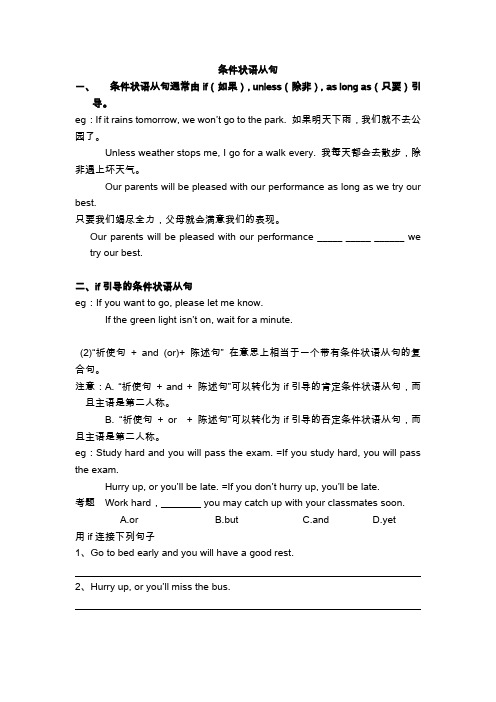
条件状语从句一、条件状语从句通常由if(如果), unless(除非),as long as(只要)引导。
eg:If it rains tomorrow, we won’t go to the park. 如果明天下雨,我们就不去公园了。
Unless weather stops me, I go for a walk every. 我每天都会去散步,除非遇上坏天气。
Our parents will be pleased with our performance as long as we try our best.只要我们竭尽全力,父母就会满意我们的表现。
Our parents will be pleased with our performance _____ _____ ______ we try our best.二、if引导的条件状语从句eg:If you want to go, please let me know.If the green light isn’t on, wait for a minute.(2)“祈使句+ and (or)+ 陈述句” 在意思上相当于一个带有条件状语从句的复合句。
注意:A. “祈使句+ and + 陈述句”可以转化为if引导的肯定条件状语从句,而且主语是第二人称。
B. “祈使句+ or + 陈述句”可以转化为if引导的否定条件状语从句,而且主语是第二人称。
eg:Study hard and you will pass the exam. =If you study hard, you will pass the exam.Hurry up, or you’ll be late. =If you don’t hurry up, you’ll be late.考题Work hard,________ you may catch up with your classmates soon.A.orB.butC.andD.yet用if连接下列句子1、Go to bed early and you will have a good rest.2、Hurry up, or you’ll miss the bus.三、if从句与主句具有以下特点:1.If从句中用一般现在时,表示未来的一种条件,从句中可以加时间状语。
U10语法--条件状语从句

Grammar for Unit 10条件状语从句一、定义:状语从句:在复合句中,由从句表示的状语叫做状语从句,在句子中起副词作用。
条件状语从句:由引导词if或unless等引导的状语从句叫做条件状语从句,条件是指某一件事情实现之后(状语从句中的动作),其它事情(主句中的动作)才能发生。
注意:在含有条件状语从句的复合句中,表示将来时态,主句是一般将来时态(或表示将来含义的),从句要用一般现在时、祈使句或情态动词[主将从现原则]。
二、类型:1.由if引导的条件状语从句:表示在某种条件下某事很可能发生。
如:If you ask him, he will help you. 如果你请他帮忙,他会帮你的。
If you fail in the exam, you will let him down. 如果你考试不及格,你会让他失望的。
if引导的条件状语从句既可以将从句放前面也可以将从句放后面If it rains, we will stop playing. / We will stop playing if it rains.如果天下雨,我们就不玩了。
2.unless conj.除非,若不,除非在……的时候You will fail to arrive there in time unless you start earlier.如果你不早点动身,你就不能及时赶到那儿。
Unless it rains, the game will be played. 除非下雨,比赛将照常进行。
3.as / so long as 只要So long as you’re happy, it doesn’t matter what you do.只要你高兴,你做什么都没有关系。
You may borrow my book as long as you keep it clean.只要你保持书的清洁,你就可以把我的书借去。
*4. in case 万一、以防、如果Take your umbrella in case it rains. 带着你的伞吧,以防下雨。
条件状语从句英语语法大全

条件状语从句英语语法大全条件状语从句条件状语从句是由引导词if或unless引导的从句。
例如:1.如果明天不下雨,我们就去远足。
2.如果你努力研究,就会取得好成绩。
3.除非他也去,否则我不会去参加聚会。
4.如果你不马上走,你将会迟到。
(如果你不走,你会迟到。
)在英语中,条件是指某一件事情实现之后(状语从句中的动作),其它事情(主句中的动作)才能发生,通常译作“假如”。
需要注意的是,在含有条件状语从句的复合句中,表示将来时态时,主句要用一般将来时态,从句要用一般现在时、祈使句或情态动词,即主将从现原则。
主将从现并不是指将来时,而是表示将来的含义,与if后的从句相呼应。
条件状语从句类型if是条件状语从句最常用的连词,表示在某种条件下某事很可能发生。
例如:1.如果你请他帮忙,他会帮你的。
2.如果你考试不及格,你会让他失望。
if引导的条件状语从句既可以将从句放前面,也可以将从句放后面。
例如:“如果天下雨,我们就不玩了”可以转化为“We will。
playing if it rains.”此外,if从句还可以表示不可实现的条件或根本不存在的条件,即一种虚拟的条件或假设,从句多用一般过去时或过去完成时。
例如:表示可能实现的条件,主句用一般将来时,从句用一般现在时。
例如:If it rains tomorrow。
we will stay at home。
如果明天下雨,我们会待在家里。
非真实条件句则表示假设的情况,分为虚拟条件句和虚拟结果句。
虚拟条件句表示与现实相反的情况,主句用would/could/might+动词原形,从句用过去时或过去完成时。
例如:If I had more time。
I would travel around the world。
如果我有更多时间,我会周游世界。
虚拟结果句则表示与现实相反的结果,主句用过去时,从句用would/could/might+动词原形。
例如:If I had studied harder。
条件状语从句语法讲解

2) 用法:(1)条件状语从句通常由连词if引导,意为“如果、假如”,主句不能用be going to 表示将来,而应该用shall,will。
If you leave now, you are never going to regret it. (错误)If you leave now, you will never regret it. (正确)(2)if “如果”,引导条件状语从句,主句用一般将来时,从句则用一般现在时,如:If it rains tomorrow, I shan’t climb the hills.另外,主句是祈使句或含有情态动词,从句也用一般现在时。
如:Please call me if he comes next Sunday.Can you call the policeman if you are in the trouble.注意宾语从句中的if与条件状语从句if的区别。
宾语从句中的if“是否”相当于whether,引导宾语从句,时态需根据语境确定。
如果主句用一般现在时,从句可以根据具体情况选用时态,如果主句用一般过去时,从句必须用过去式的某种形式。
I don``t know if it will rain tomorrow. 我不知道明天是否会下雨。
Our teacher said there was going to be a football match the next month.我们说下月将有场足球比赛。
(注意)下列从句中的will不是将来时助动词,而是情态动词。
翻译为“愿意”。
If you will excuse me,I really must go to bed .如果你能原谅我的话,我真的要睡觉了。
If you will wait a minute ,I’ll go and tell my mother that you are here .如果你愿意等一会的话,我去告诉我妈妈你来了。
条件状语从句的归纳总结

条件状语从句的归纳总结条件状语从句是英语中重要且常用的一种从句类型,它用于表示某个动作或情况发生的前提条件。
在句子中,条件状语从句通常由指示条件的连词引导,如:if(如果)、unless(除非)、provided that(倘若)、as long as(只要)等。
本文将对条件状语从句进行归纳总结,并提供常见的应用实例。
一、以if引导的条件状语从句1. 表示真实条件“如果”某个条件成立,就会发生某个结果。
例句1: If it rains tomorrow, we will stay at home.(如果明天下雨,我们会待在家里。
)例句2: If you study hard, you will pass the exam.(如果你努力学习,你会通过考试。
)2. 表示与现在或将来相反的假设“如果”某个条件成立,但事实上并不成立。
例句1: If I were you, I would apologize to her.(如果我是你,我会向她道歉。
)例句2: If I had enough money, I would buy a new car.(如果我有足够的钱,我会买一辆新车。
)3. 表示过去某个假设的结果“如果”过去某个条件成立,就会有相应的结果。
例句: If he had studied harder, he would have passed the exam.(如果他当时学得更努力,他就会通过考试。
)二、以unless引导的条件状语从句unless的意思是“除非”,用于表示某个条件不成立时才会发生某个结果。
例句1: We won't go shopping unless it stops raining.(除非停止下雨,否则我们不会去购物。
)例句2: You won't lose weight unless you exercise regularly.(除非你定期锻炼,否则你无法减肥。
条件状语从句的三种形式

条件状语从句的三种形式一、if引导的条件状语从句1、如果你乐意,我们可以去公园散步。
If you are willing, we can go for a walk in the park.2、如果他住得太远,他就不能每天都来上班。
If he lived too far, he couldn’t come to work every day.3、如果有机会,我真想去法国旅行。
If I have a chance, I would really like to travel to France.4、如果你想获得更好的成绩,你应该对自己更严格一些。
If you want better grades, you should be stricter with yourself.二、unless引导的条件状语从句1、除非你受邀,否则别去参加他们的派对。
Unless you are invited, don't go to their party.2、除非你有权限,否则请勿进入这一地区。
Unless you have permission, do not enter this area.3、除非你将成绩提高,否则不会被录取。
Unless you improve your grades, you will not be accepted.4、除非天气转好,否则我们就不会去公园玩耍。
Unless the weather turns better, we won't go to the park to play.三、as long as引导的条件状语从句1、只要你努力,我们就可以赢得这场比赛。
As long as you try hard, we can win the game.2、只要你坚持,你就可以完成这项任务。
As long as you persist, you can finish the task.3、只要你学习努力,你就可以获得优等奖学金。
初中英语语法专题—条件状语从句讲解
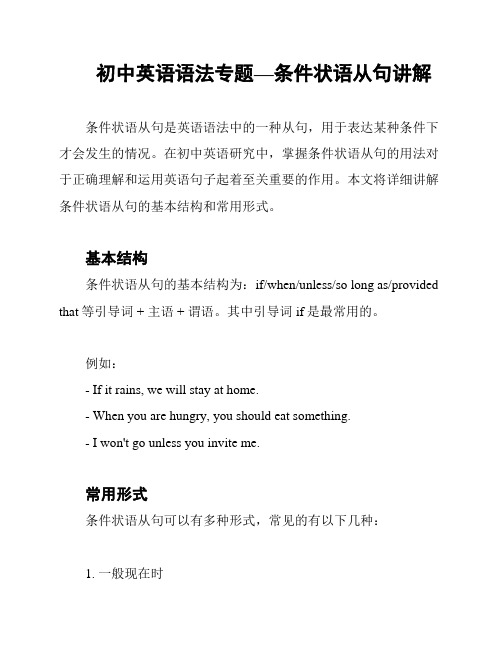
初中英语语法专题—条件状语从句讲解条件状语从句是英语语法中的一种从句,用于表达某种条件下才会发生的情况。
在初中英语研究中,掌握条件状语从句的用法对于正确理解和运用英语句子起着至关重要的作用。
本文将详细讲解条件状语从句的基本结构和常用形式。
基本结构条件状语从句的基本结构为:if/when/unless/so long as/provided that等引导词 + 主语 + 谓语。
其中引导词if是最常用的。
例如:- If it rains, we will stay at home.- When you are hungry, you should eat something.- I won't go unless you invite me.常用形式条件状语从句可以有多种形式,常见的有以下几种:1. 一般现在时如果主句是一般将来时,条件从句常用一般现在时表示将来的条件。
例如:2. 一般过去时如果主句是过去时,条件从句常用一般过去时表示过去的条件。
例如:- If it rained, we stayed at home.3. were to + V原用于表达与现在事实相反的情况,表示假设的内容。
例如:- If I were rich, I would buy a big house.4. should + V原表示建议或者要求。
例如:- If you should have any problems, feel free to ask for help.5. 省略 if在主句前可以省略if,但主句表达的语气必须是祈使句。
例如:- Study hard, and you will succeed.高级用法除了以上的基本结构和常用形式,条件状语从句还有一些高级用法需要注意。
1. 虚拟条件句表示与现在事实相反的假设情况,常用虚拟语气来表示。
例如:- If I won the lottery, I would travel around the world.2. 祈使句当主句为祈使句时,条件状语从句常用完全倒装的形式。
条件状语从句英语语法总结

条件状语从句英语语法总结条件状语从句是英语中常见的一种从句形式,用于表达条件或假设情况下的结果。
以下是关于条件状语从句的总结:1. 结构:条件状语从句由一个条件状语从句引导词(if, unless, provided that, as long as等)+ 一个主句构成。
2. 类型:条件状语从句可以分为三种类型。
- 真实条件句(Real conditional sentences):表示在实际情况下的可能性。
- 如果主句使用一般现在时,从句使用一般现在时。
- 如果主句使用一般过去时,从句使用一般过去时。
- 例:- If it rains, I will stay at home.(如果下雨,我会呆在家里。
)- If I had time, I would go to the party.(如果我有时间,我会去参加派对。
)- 虚拟条件句(Unreal conditional sentences):表示不可能或假设情况下的结果。
- 如果主句使用过去完成时,从句使用过去完成时。
- 如果主句使用 would + 动词原形,从句使用过去完成时。
- 例:- If I had known, I would have helped.(如果我知道了,我会帮忙的。
)- If I were you, I would study harder.(如果我是你,我会更加努力研究。
)- 反对现实条件句(Contrary-to-fact conditional sentences):表示与现实相反的假设情况下的结果。
- 如果主句使用 would + 动词原形,从句使用过去式。
- 例:- If I were rich, I would travel the world.(如果我富有,我会周游世界的。
)- If I knew the answer, I would tell you.(如果我知道答案,我会告诉你的。
)3. 注意事项:- 虚拟条件句中使用“were”代替“was”,与单数和复数主语无关。
条件状语从句(初)--英语语法大全

英语条件状语从句(初)知识定位条件状语从句是表示主句动作发生的前提或条件的从句。
条件状语从句分为真实条件状语从句和非真实条件状语从句。
引导条件状语从句的有if,unless,so / as long as,as / so far as,on condition that,in case,suppose,supposing 等。
条件状语从句中的谓语动词一般要用现在时或过去时代替一般将来时或过去将来时。
中考主要考察if 引导的真实条件状语从句以及从句中的时态问题,即:主句用将来时态,从句用现在时态。
知识梳理初中学习到的引导条件状语从句的连接词主要有:if(如果)、unless(除非)或as long as(只要)等。
unless 在意思上等于if...not。
一、条件状语从句用法1、引导条件状语从句最常用的连词是if,由if 引导的条件状语从句表示在某种条件下某事很可能发生。
如:If you ask him, he will help you.如果你请他帮忙,他会帮你的。
If you fail in the exam, you will let him down.如果你考试不及格,你会让他失望的。
另外,if 从句还表示不可实现的条件或根本不可能存在的条件,也就是一种虚拟的条件或假设,从句多用一般过去时或过去完成时。
如: If I were you, I would invite him to the party.如果我是你,我会邀请他参加聚会。
2、unless = if...not. 除非,若不,除非在……的时候Let's go out for a walk unless you are too tired.=If you are not too tired, let's go out for a walk.Unless it rains, the game will be played.除非下雨,比赛将照常进行。
条件状语从句英语语法详解
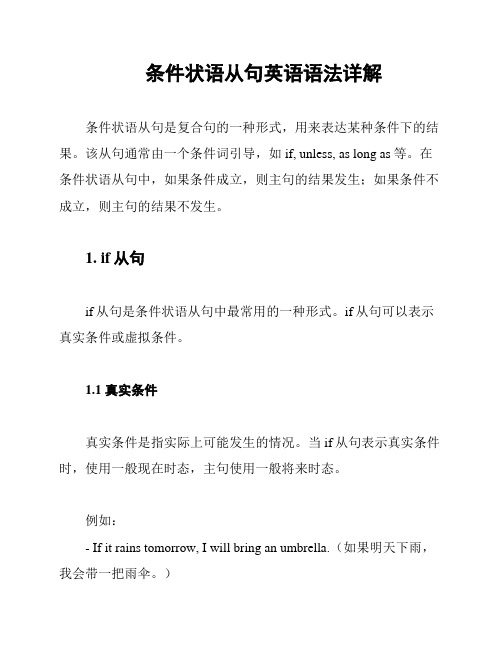
条件状语从句英语语法详解条件状语从句是复合句的一种形式,用来表达某种条件下的结果。
该从句通常由一个条件词引导,如if, unless, as long as等。
在条件状语从句中,如果条件成立,则主句的结果发生;如果条件不成立,则主句的结果不发生。
1. if从句if从句是条件状语从句中最常用的一种形式。
if从句可以表示真实条件或虚拟条件。
1.1 真实条件真实条件是指实际上可能发生的情况。
当if从句表示真实条件时,使用一般现在时态,主句使用一般将来时态。
例如:- If it rains tomorrow, I will bring an umbrella.(如果明天下雨,我会带一把雨伞。
)- If you study hard, you will pass the exam.(如果你努力研究,你会通过考试。
)1.2 虚拟条件虚拟条件是指不太可能或不实际出现的情况。
当if从句表示虚拟条件时,使用虚拟语气(subjunctive mood)来表示。
其中,对于现在或将来的情况,使用过去时态;对于过去的情况,使用过去完成时态。
例如:- If I were you, I would apologize.(如果我是你,我会道歉。
)- If I had studied harder, I would have passed the exam.(如果我当时研究更努力,我就能通过考试了。
)2. unless从句unless从句也是一个常见的条件状语从句形式,意思相当于if...not。
如果unless从句为真,则主句的结果不发生;如果unless 从句为假,则主句的结果发生。
例如:- I won't go to the party unless she invites me.(她不邀请我,我就不去参加派对。
)3. as long as从句as long as从句表示一个条件,只要这个条件满足,主句的结果就会发生。
条件状语从句英语语法要点

条件状语从句英语语法要点什么是条件状语从句?条件状语从句是英语中一种常见的从句类型,它用于表达一个条件和所产生的结果之间的关系。
条件状语从句通常由一个条件状语从句引导词引导,如“if”、“unless”、“providing (that)”等。
条件状语从句引导词引导,如“if”、“unless”、“providing (that)”等。
条件状语从句的构成条件状语从句由一个主句和一个从句构成,从句用来表达条件,而主句则表达结果。
条件状语从句引导词以下是一些常见的条件状语从句引导词:- “if”: 当条件从句中的条件为真时,主句发生。
- “unless”: 如果不满足条件从句中的条件,主句发生。
- “providing (that)”: 当条件从句中的条件为真时,主句发生。
- “as long as”: 只要条件从句中的条件为真,主句发生。
- “in case”: 以防条件从句中的条件发生,主句发生。
条件状语从句的语序条件状语从句通常采用陈述语序,即主语+谓语动词+其他成分。
陈述语序,即主语+谓语动词+其他成分。
例如:- If it rains tomorrow, we will stay at home.- Unless you study hard, you will fail the exam.是否使用逗号在条件状语从句中,通常只有在从句位于主句之前时才使用逗号。
例如:- If you have any questions, please let me know.- I will go to the party if I finish my work on time.省略条件状语从句的主语和谓语在条件状语从句中,当主句和从句的主语和谓语相同时,可以省略条件从句中的主语和谓语。
例如:- If you can, I can too.特殊情况:倒装句在某些情况下,条件状语从句的主句可以采用倒装语序。
高中英语的条件状语从句句式介绍

⾼中英语的条件状语从句句式介绍 在英语的学习中,学⽣会学习到很多的句式,下⾯店铺的⼩编将为⼤家带来⾼中英语的条件状语从句的句式介绍,希望能够帮助到⼤家。
⾼中英语的条件状语从句句式 1条件状语从句 句型1 When / So long as / As long as / Once +从句,+主句。
(从句也可以放在主句之后。
)如: As long as you give me any money, I will let you go.只要你给我⼀些钱,我就让你⾛。
Once you have begun to learn English, you should learn it well. ⼀旦你开始学习英语,你应该把它学好。
句型2 主句+on condition that+从句.如: I will go with you on condition that you give me a sum of money.我和你⼀起去的条件是你给我⼀些钱。
句型3 主句+unless+从句.(注意:由于unless本⾝是否定词,所引导的从句的谓语动词⽤肯定⽽不⽤否定。
)如: I will go there tomorrow unless it rains.我明天去那⼉除⾮下⾬。
句型4 祈使句,+and/ and then+主句。
(注意:祈使句也可⽤⼀个名词短语。
)如: Use your head, and you will find a good idea.动脑筋想⼀想,你就会想出⼀个好主意。
Another word, and I will beat you.你再说⼀句,我就揍你。
句型5 If +necessary / impossible/ important等,+主句.(注意:if与形容词之间的it is被省略。
)如: If necessary, I will do it. 如果有必要的话,我来做此事。
条件状语从句
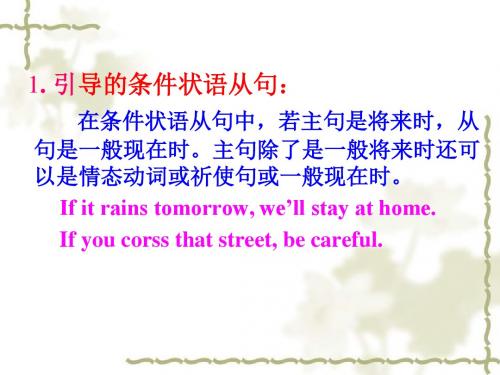
在条件状语从句中,若主句是将来时,从 句是一般现在时。主句除了是一般将来时还可 以是情态动词或祈使句或一般现在时。 If it rains tomorrow, we’ll stay at home. If you corss that street, be careful.
A. study B. studies C. will study D. studied
4. They will give us a talk if theyB __ free tomorrow. A. will be B. are C. were D. are going to 5. What __ B he do if he __ B the answer? A. will; won’t know B. will; doesn’t know
in bed ; at home…
课堂检测
请根据括号内的要求,改写下列句子,
每空一词(含缩写)。 1. How much is the English dictionary? (改为同义句)______ What's ______ the ______ price of the English dictionary? 2. He paid 100 yuan for the trousers. (改为同义句)
冠词的分类
种类 形式 意义 例词 a desk an hour a horse an egg a hand the map the man the earth 只能用在可数名词前,表 示 “一”的意思.a用在 不定冠词 a /an 以辅音音素开头的单词 前;而an用在以元音音素 开头的单词前.
定冠词
5. Be careful, or a car may hit you.
条件状语从句英语语法指南

条件状语从句英语语法指南条件状语从句是英语中常见的语法结构,用来表达一个条件引起的结果。
以下是一些关于条件状语从句的重要信息和使用指南:1. 什么是条件状语从句条件状语从句是由一个条件引起的结果的句子。
它由一个条件连词引导,例如:if(如果)、unless(除非)、as long as(只要)等。
2. 条件状语从句的结构条件状语从句由两部分组成:条件部分和结果部分。
条件部分描述引起结果的条件,而结果部分描述由条件引起的结果。
条件部分通常放在句首,而结果部分通常放在句尾。
以下是一个例子:If it rains, we will stay indoors.如果下雨,我们会呆在室内。
3. 条件状语从句的使用注意事项- 使用逗号:当条件状语从句位于句子的前半部分时,需要在条件部分和结果部分之间使用逗号进行分隔。
当条件状语从句位于句子的后半部分时,不需要使用逗号。
以下是一个示例:We will stay indoors if it rains.如果下雨的话,我们会呆在室内。
- 使用时态:条件状语从句通常使用一般现在时来表示将来可能发生的情况。
结果部分可以使用不同的时态,具体取决于上下文和需要。
以下是一些时态的示例:If I see her tomorrow, I will say hello.如果明天我见到她,我会打招呼。
If he had studied harder, he would have passed the exam.如果他学得更努力,他就能通过考试。
4. 特殊的条件状语从句- Unless:表示“除非”的意思,与if相反。
它的作用是否定条件。
以下是一个示例:Unless you study, you will fail the test.除非你研究,否则你会考不及格。
- As long as:表示“只要”的意思,用来表达条件的充分条件。
以下是一个示例:You can go outside as long as you finish your homework.只要你完成作业,你就可以出去玩。
条件状语从句用法

条件状语从句用法
条件状语从句是指通过描述一种条件来引出主句的一种子句。
条件状语从句通常由“如果”、“假如”、“要是”、“只要”等引导词引导,表示假设条件,如:“如果明天下雨,我就不去上班。
”
条件状语从句用法如下:
1. 如果从句放在主句前面时,主句要使用逗号隔开。
例如:“如果你来的话,我会准备好晚餐。
”
2. 如果从句放在主句后面时,主句和从句之间不需要逗号隔开。
例如:“我会准备好晚餐,如果你来的话。
”
3. 当条件状语从句中的条件是不可能实现时,主句的谓语动词应使用虚拟语气。
例如:“如果我会飞,我会去看看月球。
”
4. 当条件状语从句中的条件是可能实现时,主句的谓语动词应使用陈述语气。
例如:“如果他有时间,他会来参加聚会。
”
5. 条件状语从句可以嵌套使用,形成复合句。
例如:“如果明天下雨,我就不去上班;如果我不去上班,老板会很生气。
”
通过学习条件状语从句的用法,我们可以更加灵活地运用语言,为交流和表达提供更多的选择。
- 1 -。
条件状语从句用法
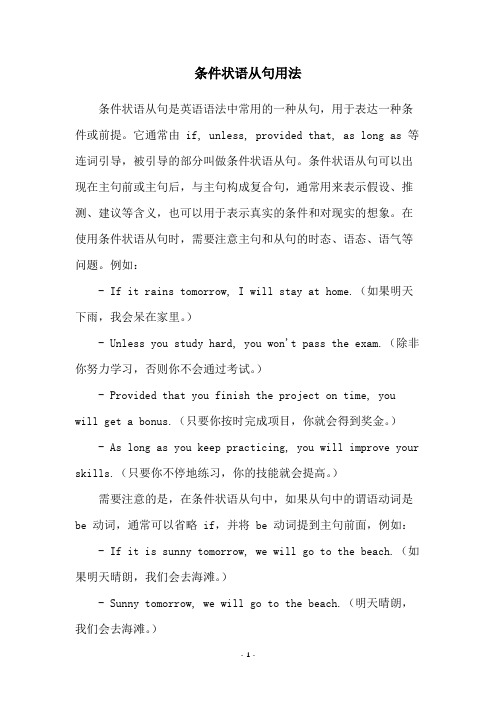
条件状语从句用法条件状语从句是英语语法中常用的一种从句,用于表达一种条件或前提。
它通常由 if, unless, provided that, as long as 等连词引导,被引导的部分叫做条件状语从句。
条件状语从句可以出现在主句前或主句后,与主句构成复合句,通常用来表示假设、推测、建议等含义,也可以用于表示真实的条件和对现实的想象。
在使用条件状语从句时,需要注意主句和从句的时态、语态、语气等问题。
例如:- If it rains tomorrow, I will stay at home.(如果明天下雨,我会呆在家里。
)- Unless you study hard, you won't pass the exam.(除非你努力学习,否则你不会通过考试。
)- Provided that you finish the project on time, youwill get a bonus.(只要你按时完成项目,你就会得到奖金。
)- As long as you keep practicing, you will improve your skills.(只要你不停地练习,你的技能就会提高。
)需要注意的是,在条件状语从句中,如果从句中的谓语动词是be 动词,通常可以省略 if,并将 be 动词提到主句前面,例如: - If it is sunny tomorrow, we will go to the beach.(如果明天晴朗,我们会去海滩。
)- Sunny tomorrow, we will go to the beach.(明天晴朗,我们会去海滩。
)但是,这种省略 if 的用法通常只适用于口语,不建议在正式的写作中使用。
- 1、下载文档前请自行甄别文档内容的完整性,平台不提供额外的编辑、内容补充、找答案等附加服务。
- 2、"仅部分预览"的文档,不可在线预览部分如存在完整性等问题,可反馈申请退款(可完整预览的文档不适用该条件!)。
- 3、如文档侵犯您的权益,请联系客服反馈,我们会尽快为您处理(人工客服工作时间:9:00-18:30)。
If it is sunny this weekend, what will you do ?
If it is sunny this weekend, I __w_i_ll_p_l_a_y__ football with my classmates.
play computer games
if条件状语从句(2)
句子特点: 1.if从句中用一般现在时,表示未来的一种条件, 从句中可以加时间状语。 2.当if表示未来的条件时,主句中用一般将来时。 句型结构: 主句+if条件状语从句 if条件状语从句,+主句(从句后加逗号)
If I’m late, _I _w_i_ll__s_a_y_s__o_r_ry____.
If it rains tomorrow, I_w_i_l_l _w_a_t_c_h__T_V__a_t_h__o_m__e. I won’t__p_la__y_b_a__s_k_e_t_b_a_ll_.
If it _d_o_e_s__n_’t__ra_i_n__ tomorrow,
Look and say
If I’m hungry,
I will_e_a_t_s_o_m__e__fo_o_d__.
If I’m tired,
I will__h_a_v_e_a__r_e_s_t __.
Look and say
If I’m ill, _I_w_i_l_l _s_e_e__a_d_o__c_to__r_.
If it is sunny this weekend, I__________.
If it is sunny this weekend, what won’t you do ?
If it is sunny this weekend, I _W__o_n_’_t _s_ta_y__a_t_h_o_m__e____.
)
当句末为or not时,引导词只能用whether而不能用if.
If 与whether 的区别
1. I don’t know _____ he will come or not. 与or not 连用只能用whether
2. I don’t care of ______ he is handsome. 介词后只能用whether
1.If you __li_s_te_n__(listen) to the music, _b_u_y__ (buy) a CD.
2. If he___is___ (be) late for school,d_o_n_’t_w__ait
(not wait ) for him.
3. If you _b_u_y_ (buy) a new camera, __g_et_ (get)
原句式 引导词 从句语序
一般 whether 改为陈述句
疑问句 /if
语序
宾 语 从 句
由从属连词whether, if 引导的宾语从句
e.g. 1. I want to know _i_f_(_w_h_e_t_h_e_r_) _h_e_w__il_l_g_o_t_o__th_e__p_a_r_k_w__it_h_.us
If从句 条件状语从句
What will I do if it is sunny this weekend?
Part1:If 的用法
1.I want to know if he will go to park with us. 宾语从句 2. We will have a picnic if it doesn’t rain.
a good one.
4. If the light _d_o_e_s_n_’t__co_m__e_ (not come) on, _w__a_it (wait) for one minute.
If 条件状语从句(1)
句型结构
祈使句+if条件状语从句 if条件状语从句,+祈使句(从句后加逗号)
时态
3. If you boil water, it becomes steam.
4. If you feel tired, you must have a rest. 条词,引导宾语从 句。(是否)
语法2:if(如果)引 导的条件状语从句
❀ if 用于宾语从句中
3. He wondered ______ to stay here the next week.
与to do 不定式连用只能用whether 4. ____ he will come is not decided.
作主语只能用whether
If 引导条件状语从句
Complete the sentences with the correct form of the words.
if条件状语从句要用一般现在时。
What will you do if you’re happy?
❖ If I’m happy, I will _cl_a_p_m__y_h_a_n_d_s_. ❖ If I’m happy, I will _s_ta_m__p_m__y_f_e_e_t . ❖ If I’m happy, I will _n_o_d_m__y_h_e_a_d__. ❖ If I’m happy, I will __w_i_n_k_m__y__e_y_e_s_.
If it is sunny this weekend, I _w__o_n_’_t _w_a_t_c_h_t_e_le_v_i_s_io_n__.
practice
If you are free this weekend, what will you do ?
sleep
If I am free ,… watch TV
(他是否跟我们一起去公园)
2. Ask him _w_h_e_t_h_e_r_(_i_f)_h__e_c_a_n_c_o_m__e. (他是否能来) 3. I didn’t know _w_h_e_t_h_e_r_i_t_w_a_s__g_o_in_g__t_o_r_a_i_n_o_r_n.(ot是否要下雨
